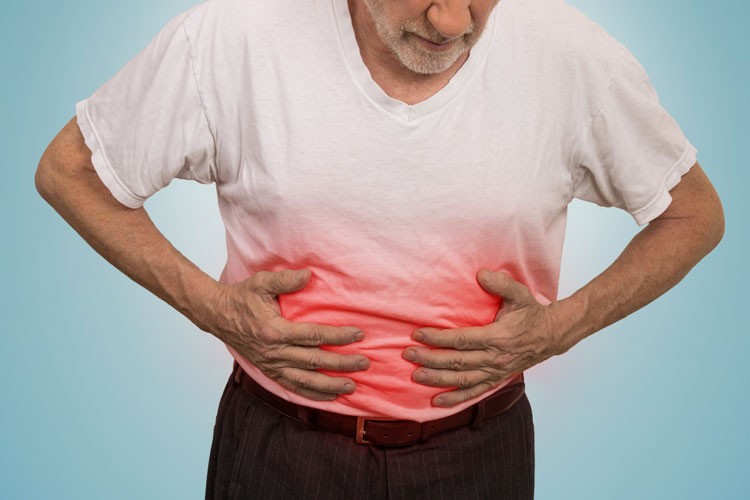Table of contents
Irritable bowel syndrome (IBS) is a common disorder that affects the large intestine (colon). It commonly causes cramping, abdominal pain, bloating, gas, diarrhoea and constipation. IBS is a chronic condition that you will need to manage long term.
Even though signs and symptoms are uncomfortable, IBS, unlike ulcerative colitis and Crohn’s disease, which are forms of inflammatory bowel disease, doesn’t cause changes in bowel tissue or increase your risk of colorectal cancer.
Only a small number of people with irritable bowel syndrome have severe signs and symptoms. Some people can control their symptoms by managing diet, lifestyle and stress. Others will need medication and counselling.

SYMPTOMS
The signs and symptoms of irritable bowel syndrome can vary widely from person to person and often resemble those of other diseases. Among the most common are:
- Abdominal pain or cramping
- A bloated feeling
- Gas
- Diarrhoea or constipation — sometimes alternating bouts of constipation and diarrhoea
- Mucus in the stool.
For most people, IBS is a chronic condition, although there will likely be times when the signs and symptoms are worse and times when they improve or even disappear completely.
WHEN TO SEE A DOCTOR?
It’s important to see your doctor if you have a persistent change in bowel habits or if you have any other signs or symptoms of IBS because these may indicate a more serious condition, such as colon cancer.
Symptoms that may indicate a more serious condition include:
- Rectal bleeding
- Abdominal pain that progresses or occurs at night
- Weight loss.
Your doctor may be able to help you find ways to relieve symptoms as well as rule out colon conditions, such as inflammatory bowel disease and colon cancer. Your doctor can also help you avoid possible complications from problems such as chronic diarrhoea.
CAUSES
It’s not known exactly what causes irritable bowel syndrome, but a variety of factors play a role. The walls of the intestines are lined with layers of muscle that contract and relax in a coordinated rhythm as they move food from your stomach through your intestinal tract to your rectum. If you have irritable bowel syndrome, the contractions may be stronger and last longer than normal, causing gas, bloating and diarrhoea. Or the opposite may occur, with weak intestinal contractions slowing food passage and leading to hard, dry stools.
Abnormalities in your gastrointestinal nervous system also may play a role, causing you to experience greater than normal discomfort when your abdomen stretches from gas or stool. Poorly coordinated signals between the brain and the intestines can make your body overreact to the changes that normally occur in the digestive process. This overreaction can cause pain, diarrhoea or constipation.
TRIGGERS VARY FROM PERSON TO PERSON
Stimuli that don’t bother other people can trigger symptoms in people with IBS — but not all people with the condition react to the same stimuli. Common triggers include:
- Foods: the role of food allergy or intolerance in irritable bowel syndrome is not yet clearly understood, but many people have more severe symptoms when they eat certain things. A wide range of foods has been implicated — chocolate, spices, fats, fruits, beans, cabbage, cauliflower, broccoli, milk, carbonated beverages and alcohol to name a few;
- Stress: most people with IBS find that their signs and symptoms are worse or more frequent during periods of increased stress, such as finals week or the first weeks on a new job. But while stress may aggravate symptoms, it doesn’t cause them;
- Hormones: because women are twice as likely to have IBS, researchers believe that hormonal changes play a role in this condition. Many women find that signs and symptoms are worse during or around their menstrual periods;
- Other illnesses: sometimes another illness, such as an acute episode of infectious diarrhoea (gastroenteritis) or too many bacteria in the intestines (bacterial overgrowth), can trigger IBS.
RISK FACTORS
Many people have occasional signs and symptoms of irritable bowel syndrome, but you’re more likely to have IBS if you:
- Are young: IBS tends to occur in people under age 45;
- Are female: overall, about twice as many women as men have the condition;
- Have a family history of IBS: studies suggest that people who have a family member with IBS may be at increased risk of the condition;
- Have a mental health problem: anxiety, depression, a personality disorder and a history of childhood sexual abuse are risk factors. For women, domestic abuse may be a risk factor as well.
The influence of family history on IBS risk may be related to genes, shared factors in a family’s environment or both.
COMPLICATIONS
Diarrhoea and constipation, both signs of irritable bowel syndrome, can aggravate haemorrhoids. In addition, if you avoid certain foods, you may not get enough of the nutrients you need, leading to malnourishment.
But the condition’s impact on your overall quality of life may be the most significant complication. These effects of IBS may cause you to feel you’re not living life to the fullest, leading to discouragement or depression.

TESTS AND DIAGNOSIS
A diagnosis of irritable bowel syndrome depends largely on a complete medical history and physical exam.
Criteria for making a diagnosis
Because there are usually no physical signs to definitively diagnose IBS, diagnosis is often a process of ruling out other conditions. To help this process, researchers have developed two sets of diagnostic criteria for IBS and other functional gastrointestinal disorders — conditions in which the bowel appears normal but doesn’t work (function) normally. Both criteria are based on symptoms after other conditions have been ruled out.
- Rome criteria: according to these criteria, you must have certain signs and symptoms before a doctor diagnoses irritable bowel syndrome. The most important are abdominal pain and discomfort lasting at least three days a month in the last three months, associated with two or more of following: improvement with defecation, altered frequency of stool or altered consistency of stool.
- Manning criteria: these criteria focus on pain relieved by defecation, having incomplete bowel movements, mucus in the stool and changes in stool consistency. The more symptoms present, the greater the likelihood of IBS.
Your doctor will likely assess how you fit these criteria, as well as whether you have any other signs or symptoms that might suggest another, more serious, condition. Some red flag signs and symptoms that suggest a need for additional testing include:
- New onset after age 50;
- Weight loss;
- Rectal bleeding;
- Fever;
- Nausea or recurrent vomiting;
- Abdominal pain, especially if it’s not completely relieved by a bowel movement, or occurs at night;
- Diarrhoea that is persistent or awakens you from sleep;
- Anaemia related to low iron.
If you fit the IBS criteria and don’t have any red flag signs or symptoms, your doctor may suggest a course of treatment without doing additional testing. But if you don’t respond to that treatment, you’ll likely require more tests.
Additional tests
Your doctor may recommend several tests, including stool studies to check for infection or problems with your intestine’s ability to take in the nutrients from food (malabsorption). You may undergo a number of tests to rule out other causes for your symptoms.
• Imaging tests
- Flexible sigmoidoscopy: this test examines the lower part of the colon (sigmoid) with a flexible, lighted tube (sigmoidoscope).
- Colonoscopy: in some cases, especially if you are age 50 or older or have other signs of a potentially more serious condition, your doctor may perform this diagnostic test in which a small, flexible tube is used to examine the entire length of the colon.
- X-rays: sometimes doctors will use X-rays to obtain an image of your colon.
- CT scan: CT scans of your abdomen and pelvis may help your doctor rule out other causes of your symptoms, especially if you have abdominal pain.
• Laboratory tests
- Lactose intolerance tests: lactase is an enzyme you need to digest the sugar found in dairy products. If you don’t produce this enzyme, you may have problems similar to those caused by irritable bowel syndrome, including abdominal pain, gas and diarrhoea. To find out if this is the cause of your symptoms, your doctor may order a breath test or ask you to remove milk and milk products from your diet for several weeks.
- Breath tests: your doctor may perform a breath test to look for a condition called bacterial overgrowth, in which bacteria from the colon grow up into the small intestine, leading to bloating, abdominal discomfort and diarrhoea. This is more common among people who have had bowel surgery or who have diabetes or some other disease that slows down digestion.
- Blood tests: Coeliac disease is sensitivity to wheat, barley and rye protein that may cause signs and symptoms like those of irritable bowel syndrome. Blood tests can help rule out this disorder. Children with IBS have a far greater risk of celiac disease than do children who don’t have IBS. If your doctor suspects that you have celiac disease, he or she may perform an upper endoscopy to obtain a biopsy of your small intestine.
- Stool tests: if you have chronic diarrhoea, doctors may want to examine your stool for bacteria or parasites.
TREATMENTS
Because it’s not clear what causes irritable bowel syndrome, treatment focuses on the relief of symptoms so that you can live as normally as possible.
In most cases, you can successfully control mild signs and symptoms of irritable bowel syndrome by learning to manage stress and making changes in your diet and lifestyle. Try to avoid foods that trigger your symptoms. Also try to get enough exercise, drink plenty of fluids and get enough sleep.
If your problems are moderate or severe, you may need more than lifestyle changes. Your doctor may suggest medications.
Dietary changes
- Eliminating high-gas foods: if you have bothersome bloating or are passing considerable amounts of gas, your doctor may suggest that you cut out such items as carbonated beverages, vegetables — especially cabbage, broccoli and cauliflower — and raw fruits.
- Eliminating gluten: research shows that some people with IBS report improvement in diarrhoea symptoms if they stop eating gluten (wheat, barley and rye).
- Eliminating FODMAPs: some people are sensitive to types of carbohydrates such as fructose, fructans, lactose and others, called FODMAPs (Fermentable Oligo-, Di-, and Monosaccharides and Polyols). FODMAPs are found in certain grains, vegetables, fruits and dairy products. However, often people are not bothered by every FODMAP food. You may be able to get relief from your IBS symptoms on a strict low FODMAP diet and then reintroduce foods one at time
Medications
a) Constipation medications
- Fibre supplements: taking fibre supplements with fluids may help control constipation. Fibre obtained from food may cause much more bloating compared with a fibre supplement. Make sure you drink plenty of water when you take fibre supplement.
Exemple: NATUFIB (Fructo-oligosaccharide (FOS) soluble fibre) - Osmotic laxatives: if fibre doesn’t help symptoms, your doctor may prescribe an osmotic laxative which will pull water back into your colon, softens your stool so it is easier to get it out of your body. Like fibre, just make sure you drink plenty of water when you take them to avoid getting dehydrated.
Examples: sorbitol, lactulose. - Stimulant laxatives: stimulant laxative triggers muscles around your intestines to squeeze and move stool through your colon. You shouldn’t take them on a regular basis because it will make your body get used to the medication that they won’t work for you anymore.
Example: bisacodyl. - Other drugs for constipation: there is also a medication prescribed to normalize your bowel movements.
Example: prucalopride.
b) Diarrhoeal medications
- Over-the-counter medications can help control diarrhoea and some people will benefit from medications called bile acid binders but these can lead to bloating.
Examples: loperamide and cholestyramine (bile acid binders).
c) Anticholinergic and antispasmodics medications
- These medications can help relieve painful bowel spasms. They are sometimes used for people who have bouts of diarrhoea, but they can worsen constipation and can lead to other symptoms, such as difficulty urinating. They should also be used with caution among people with glaucoma.
Examples: hyoscine butylbromide, dipropyline.
d) Antidepressant medications
- If your symptoms include pain or depression, your doctor may recommend a tricyclic antidepressant or a Selective Serotonin Reuptake Inhibitor (SSRI). These medications help relieve depression as well as inhibit the activity of neurons that control the intestines. If you have diarrhoea and abdominal pain without depression, your doctor may suggest a lower than normal dose of tricyclic antidepressants. SSRIs may be helpful if you’re depressed and have pain and constipation.
Examples: fluoxetine, paroxetine.

Counselling
• You may benefit from counselling if you have depression or if stress tends to worsen your symptoms.
Lifestyle and Home Remedies
In many cases, simple changes in your diet and lifestyle can provide relief from irritable bowel syndrome. Although your body may not respond immediately to these changes, your goal is to find long-term, not temporary, solutions:
- Experiment with fibre: when you have irritable bowel syndrome, fibre can be a mixed blessing. Although it helps reduce constipation, it can also make gas and cramping worse. The best approach is to slowly increase the amount of fibre in your diet over a period of weeks. Examples of foods that contain fibre are whole grains, fruits, vegetables and beans. If your signs and symptoms remain the same or worse, tell your doctor. You may also want to talk to a dietician.
- Some people do better limiting dietary fibre and instead take a fibre supplement that causes less gas and bloating. If you take a fibre supplement, be sure to introduce it slowly and drink plenty of water every day to reduce gas, bloating and constipation. If you find that taking fibre helps your IBS, use it on a regular basis for best results.
- Avoid problem foods: if certain foods make your signs and symptoms worse, don’t eat them. These may include alcohol, chocolate, caffeinated beverages such as coffee and sodas, medications that contain caffeine, dairy products, and sugar-free sweeteners such as sorbitol or mannitol.
- If gas is a problem for you, foods that might make symptoms worse include beans, cabbage, cauliflower and broccoli. Fatty foods also may be a problem for some people. Chewing gum or drinking through a straw can lead to swallowing air, causing more gas.
- Eat at regular times: don’t skip meals, and try to eat about the same time each day to help regulate bowel function. If you have diarrhoea, you may find that eating small, frequent meals makes you feel better. But if you’re constipated, eating larger amounts of high-fibre foods may help move food through your intestines.
- Take care with dairy products: if you’re lactose intolerant, try substituting yogurt for milk. Or use an enzyme product to help break down lactose. Consuming small amounts of milk products or combining them with other foods also may help. In some cases, though, you may need to stop eating dairy foods completely. If so, be sure to get enough protein, calcium and B vitamins from other sources.
- Drink plenty of liquids: try to drink plenty of fluids every day. Water is best. Alcohol and beverages that contain caffeine stimulate your intestines and can make diarrhoea worse, and carbonated drinks can produce gas.
- Exercise regularly: exercise helps relieve depression and stress, stimulates normal contractions of your intestines, and can help you feel better about yourself. If you’ve been inactive, start slowly and gradually increase the amount of time you exercise. If you have other medical problems, check with your doctor before starting an exercise program.
- Use anti-diarrheal medications and laxatives with caution: if you try over-the-counter anti-diarrheal medications, such as Imodium or Kaopectate (equivalent to Actapulgite), use the lowest dose that helps. Imodium may be helpful if taken 20 to 30 minutes before eating, especially if you know that the food planned for your meal is likely to cause diarrhoea. In the long run, these medications can cause problems if you don’t use them correctly. The same is true of laxatives. If you have any questions about them, check with your doctor or pharmacist.
GASTRO-ENTEROLOGY & HEPATOLOGY DEPARTMENT
FV Hospital, 2nd Floor, F Building
Tel: (028) 54 11 34 66
or (028) 35 11 33 33 – Ext: 1164, 1234



